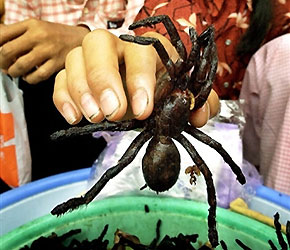But Mendez hopes that, given a chance, his dishes inspired by the isolated Yanomami tribe of Venezuela’s southern rain forests can please discriminating palates and gain a following in the country’s culinary circles.
“At the first event I held, everyone was shocked,” Mendez said on the sidelines of a gastronomy fair in Caracas. “After the people try these things, they change.”
During a demonstration at the fair, an audience of amateur cooks and students gasped as Mendez unveiled a smoked monkey used to make soup and his assistants handed out cookies made with “Bachaco,” large ants with an enduring, spicy aftertaste.
Alvaro Insausti, a 21-year-old university student and aspiring chef, said he was surprised by the innovative dishes, despite being distracted by the immense tarantulas crawling about inside containers next to a table topped with rare fruits, caiman meat, earthworms and dried paca, a rodent weighing up to 10 kilograms (22 pounds).
“We have restaurants in Venezuela offering foods from all over the world from Spanish, Chinese and Italian but unfortunately we don’t know anything about the cooking of our own indigenous tribes,” Insausti said.
Josefa Maria Briceno, a 36-year-old doctor, said the spider croquette “tasted smokey and spicy,” but “looked really weird with the black legs sticking out.”
Mendez, a native of southern Amazonas state, said he became interested in the Yanomami’s diet after a series of trips into the rain forest where the tribe provides for itself through hunting, gathering and fishing. By sharing the secrets of their cuisine with mainstream Venezuela, he hopes to help preserve Yanomami culture.
The 43-year-old chef said he chose the tribe “because they’re the most ethnically pure of them all, and don’t like to be near what they call ‘the white man,’ close to what we call civilization.”
A warlike tribe known for fierce intertribal conflicts, the Yanomami mostly live in non-permanent settlements on both sides of Venezuela’s southern border with Brazil.
Cassava, plantains and grubs are dietary staples for the Yanomami, who cultivate edible insects inside rotten logs. Manioc, a large tuber often planted on the outskirts of their villages, is leached and dried to remove cyanide and then baked over an open fire into bread.
Rain forest animals ranging from monkeys to snakes to tapirs – mammals with short snouts that roughly resemble a pig in shape and size – are important sources of protein.
Mendez said that on his first foray into the jungle, many Indians would not admit to eating worms or grubs because they knew that Venezuela’s majority mestizo population do not share such tastes. But that changed once he ate a piece of grilled paca.
“They started to bring out all the things they had hidden,” Mendez said, laughing.
Mendez hopes eventually to launch a restaurant offering Yanomami-style dishes in the capital of Caracas – if he can overcome the logistical hurdles involved in gathering and transporting ingredients from the remote jungle.
“People want to try it,” he said.

